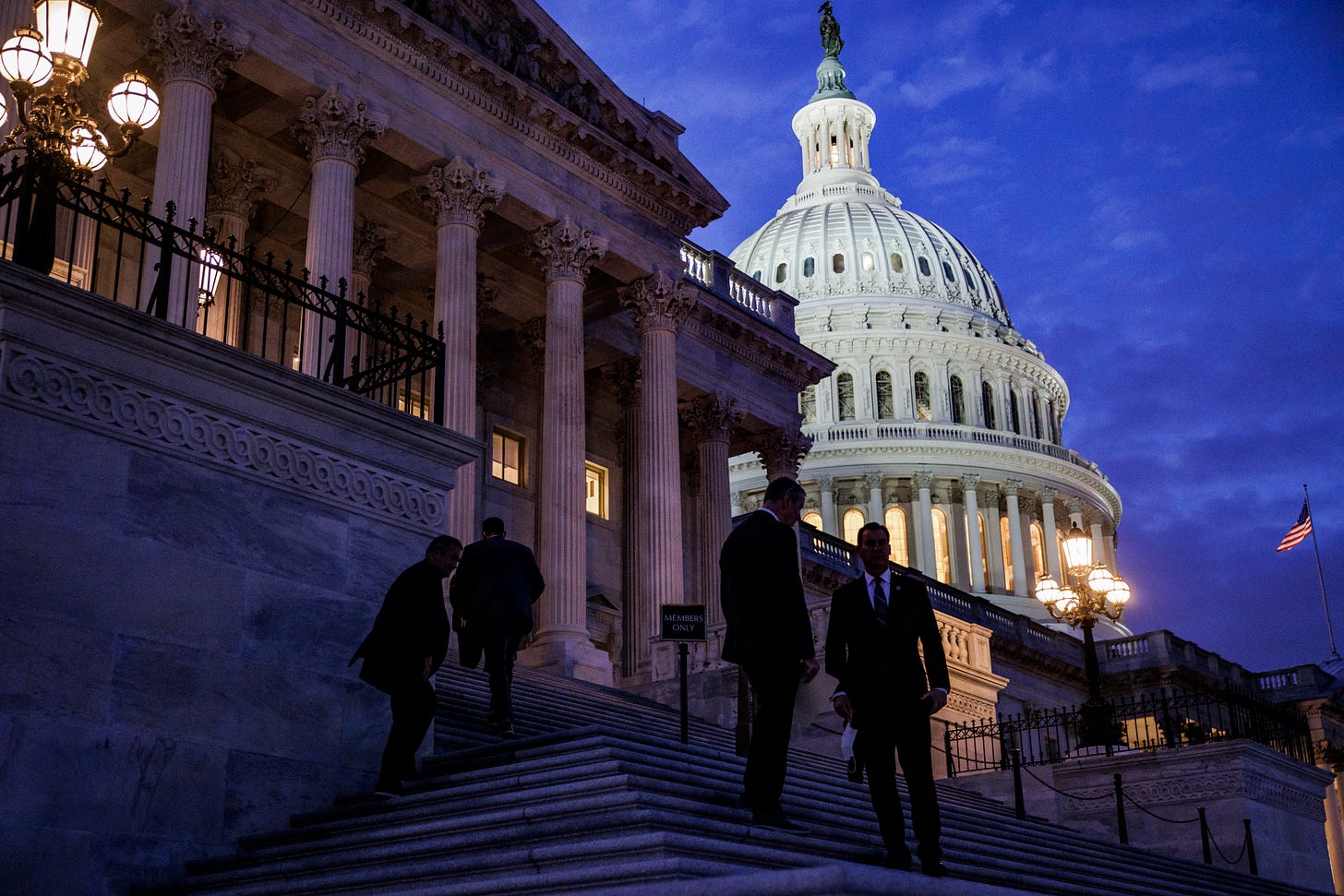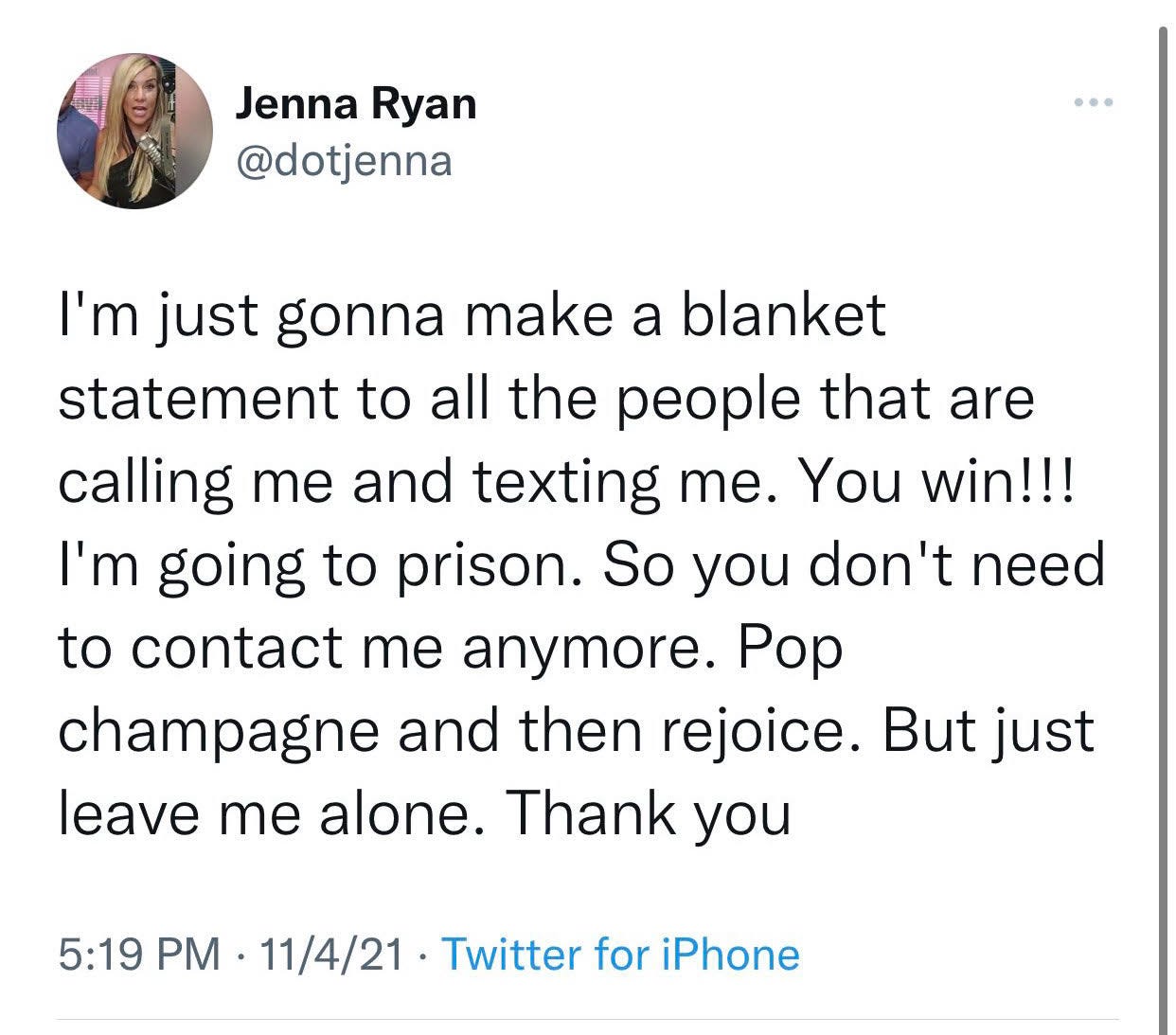I know you are dying for deep thoughts and insight about today’s infrastructure votes. But it’s Friday and I spent the whole day in bed after getting the Moderna booster shot.
So let’s start with this palate cleanser.
Karma update
Shot.
Chaser.
A Texas real estate agent who bragged after Jan. 6 that as a blonde White woman she would not be going to jail for joining in the assault on the U.S. Capitol by a pro-Trump mob was sentenced Thursday to two months of incarceration.
It was one of the harshest penalties imposed to date on a participant in events at the Capitol who was found guilty only of a petty offense.
“For better or worse, you’ve become one of the faces of January 6,” U.S. District Judge Christopher R. Cooper of D.C. told Jenna Ryan, 50. She gained national attention by defending her conduct at the Capitol in media interviews and on Twitter. Because of that notoriety, Cooper said, people would look to her sentence as evidence of “how our country responded to what happened.”
He continued, “I think the sentence should tell them that we take it seriously, that it was an assault on our democracy . . . and that it should never happen again.”
Is today finally Infrastructure Day? For real?
Maybe. Not really. Sort of.
As we start the day, it seems likely that (1) the House will finally pass the $1 trillion bipartisan infrastructure bill (BIF) and send it to President Biden’s desk. (2) Maybe they’ll also pass their own version of the $1.75 trillion social spending bill (BBB), which is DOA in the Senate.


Yeah, this should work.


CRT Revisited
No space here to relitigate the issue, but this is a very useful thread from freelance journalist Rachel Cohen (I’ve unrolled it).
[W]hen Republicans like Youngkin talk about banning teaching CRT, they are saying among other things that they won't support teaching that America is fundamentally racist, that some people are inherently disadvantaged/oppressed, advantaged, oppressive.
(She links to this):
To @Nate_Cohn’s point — check out the section of Glenn Youngkin’s speech on critical race theory from his final campaign rally in Loudoun County, and how he frames it. This is basically what he always said on the stump in the race’s closing weeks: https://t.co/LfKDxL77Fi
Note here he claims he supports teaching 'dark parts' of U.S. history. (does he mean it? devil's in detail of vague intimidating statutes) but should be noted that many progressives have responded to CRT attacks precisely by saying GOP wants to avoid teaching dark history.
So if you're a parent and you're hearing activists say "they want us to stop teaching about slavery and lynching and redlining" and Youngkin goes "of course we will teach about those things" — it's a different terrain.
Many have said, "but CRT isn't even taught in K-12! it's a *law school* level concept!" ...but that doesn't really hold water. and who actually thinks younger students are not capable of learning about racism being systemically embedded in society? Not me & probably not you.
A lot of this obfuscates is the real debate over how we teach about systemic racism in schools, and how much and relatedly, the question of how fundamental racism is to America's story, past and present. these are not settled questions in K12 or in academia.
[I] spent time over the summer digging into messaging guides on the left being developed to counter CRT attacks. I was sympathetic to their task, it's a hard challenge. And I’m no PR expert. But I am pretty good at detecting *avoidance* in talking points https://theintercept.com/2021/07/27/critical-race-theory-education-history.
Multiple things can be true at the same time:
'CRT' -- yes it's being used as a dog whistle, exploited as a wedge, oft misconstrued from its original scholars' vision
There's also this very real tension right now in defining how race and racism will be taught in schools.
Et tu, NYT?
Remarkable coming from The New York Times editorial board: “Democrats Deny Political Reality at Their Own Peril.”
Familiar takeaways like “wake-up call” and “warning shot” don’t do justice here because the danger of ignoring those trends is too great. What would do justice, and what is badly needed, is an honest conversation in the Democratic Party about how to return to the moderate policies and values that fueled the blue-wave victories in 2018 and won Joe Biden the presidency in 2020.
(!)
Democrats, looking left on so many priorities and so much messaging, have lost sight of what can unite the largest number of Americans. A national Democratic Party that talks up progressive policies at the expense of bipartisan ideas, and that dwells on Donald Trump at the expense of forward-looking ideas, is at risk of becoming a marginal Democratic Party appealing only to the left.
(!)
Many in the president’s party point to Tuesday as proof that congressional Democrats need to stop their left-center squabbling and clock some legislative wins ASAP by passing both the bipartisan infrastructure bill and a robust version of the Build Back Better plan, the larger social spending and environmental proposal. They believe this will give their candidates concrete achievements to run on next year and help re-energize their base.
But Tuesday’s results are a sign that significant parts of the electorate are feeling leery of a sharp leftward push in the party, including on priorities like Build Back Better, which have some strong provisions and some discretionary ones driving up the price tag. The concerns of more centrist Americans about a rush to spend taxpayer money, a rush to grow the government, should not be dismissed.
(!)
As our colleague Mona Charen notes:


Quick Hits
1. “Family Values” and the GOP Class of 2022
Must-read from Amanda Carpenter in today’s Bulwark:
Herschel Walker, Eric Greitens, and Sean Parnell are all considered serious contenders to win the Republican nominations for Senate seats in, respectively, Georgia, Missouri, and Pennsylvania. Each of them has been accused of aggressively threatening and violating women in their lives.
If they win their party’s nominations, it may complicate life for the aspiring Youngkins of 2022.
2. Not My Party: Dems in Trouble—the Price of Incompetence
3. Policing for Profit Targets Low-Income People Who Can’t Afford to Fight Back
Jennifer McDonald writes in the Bulwark:
The perverse incentives that allow police and prosecutors to keep what they seize have made civil forfeiture into the behemoth it is today. But policymakers can curb these abuses by reforming state and federal forfeiture laws. To protect Americans from losing property unjustly, Congress and state legislatures must end civil forfeiture and the financial incentive that fuels it.
Cheap Shots
You stay classy, Schlapps.
Not at all, insane, reckless, and deranged.

When you are too crazy for Newsmax.
Newsmax has pulled White House correspondent Emerald Robinson off the air following her bizarre claim that COVID vaccines contain bioluminescence that some say can be tracked by the Devil.













I'm willing to take the Lefties' word for it, that CRT, as such, is not being taught in public schools. I can only assume that, like other segments of Critical Theory, it is couched in the opaque polysyllabic jargon of postmodernism and accessible only to those who've had extensive training in that arcane skill. What parents do see, I'm sure, is the resulting policies pushed by CRT initiates such as the war on excellence seen in di Blasio's effort to abolish the selective schools in NYC or the proposal to "reform" the math curriculum in California to make it conform to DIE objectives. In any case, the insistence that CRT is not in the curriculum, that what's being taught is not CRT, reminds me of the Socialists' reply to criticism based on the record of Socialist regimes, that "real" Socialism has never been tried. (Translation: I have not yet been made the Autocrat of All Creation.)
I'm getting kind of tired of asking you to explain what policies you want liberals to adhere to. Again, both moderates in Virginia and New Jersey had problems or lost, same as liberals did. It's not clear that popularism is actually popular. If you're going to say 'liberals need to stop trying to do things and instead do other things' you need to be specific as to what you want, Charlie. It's not enough to say 'be more moderate' without defining what it means to be a moderate in 2021. Because again, in Virginia the former governor, a moderate who ran on kitchen table issues, lost to an insurrectionist sympathizer. So unless you're going to say that his method was successful, you're going to need to actually say what you think he and other liberals should run on. Because yelling 'be moderate' doesn't actually mean anything to most people who can only define the term based on where they think their opponents are.
As for CRT, it's clear now that the problem is that most liberals are incapable of grasping that words often do not have esoteric or branching meanings to most people. Example, 'racist' conjures up a very specific image, as does 'racism.' At least, to moderates and conservatives. To liberals, the terms is more open and flowing. For example, racism isn't just men in hoods to them, it's the policies that cause things like increased incarceration against minorities, and the people who support those policies. It's the belief that, if you support things like segregated schools based on wealth, which often means color, you are also a racist, even if you're not directly marching with the tiki torch guys. If you're afraid of willie horton, then you must be a racist.
This extrapolation is everywhere. And in many situations, they come to these conclusions armed with lots of data and ideas. But they're rather terrible at actually making it make sense to those who aren't versed in the liberal nomenclature. Let's put it like this: conservatives have the fox news cinematic universe. Liberals have something similar in regards to words like 'racist' though I don't know what to call it.
The issue of CRT is that it's very easy to be like 'they're trying to make people feel guilty about being white!' which is where liberals say it's an overtly racist dogwhistle against learning history. Part of this comes from certain sections of liberal thought that says the sins of the father are the sins of the son, so to speak. Your ancestors set up these systems, they did so with racist intentions, and so if you defend them you must be racist, because you're defending a system created by and meant for racist reasons. A lot of people would disagree with this, and that's partially why liberals struggle so much. Because people don't see themselves as inheriting a racist system. They see themselves as simply existing in a time when these things were already set up. They didn't make these systems, they don't have the power to change them, so why are you getting mad at them for going along with things, goes the thinking.
We talk a lot about how silence is acceptance, which is why liberals are quick to point fingers at those who talk a lot about how bad fascism is, but not about how bad racism is. If you're mad about systems that enforce or make it easier for fascists to gain power, why aren't you also mad about the same systems that create racist outcomes? Again, you can agree or disagree with this, but that's the thinking.
I think the issue with CRT is that liberals are refusing to say what they really want which is: yes, we are changing how we teach things, because we're doing it better than we did before. The past was complicated, and how we teach kids should reflect that. People are neither good nor evil for the most part, but that doesn't mean there weren't terrible things in the past that we should work towards being better than. If the goal of education is to produce better citizens, then logically we should be striving to not be teaching, say, lost cause narratives in text books, something that still happens in much of the south today for example.
Instead, by trying to say nothing has changed, they've let the CRT moral panic swallow up lots of airtime and define itself as 'actually, the people complaining about racists are the real racists, and also the people who are mad about segregation are the real segregationists.'
One last bit. One issue that the CRT panic is about but which we don't talk a lot about is how, for most of our history, the idea was that there was an arc of progress, that we moved forward, that there was a kind of manifest destiny at work, and that America was a special, blessed place. Reality is not that simple, and there were a lot of people who had to be enslaved and displaced and killed in that whole arc of progress thing. But it's a story that Americans have told ourselves and used to justify ourselves since our creation. Now, people question whether that was actually an arc of progress, and whether it was right or wrong to exterminate people and the like. But they don't have a better story to tell in its place yet, so what ends up happening is a backlash against changing the story.
The same thing happens all the time if you deal with civil war stories. There are lots of people in the south who have stories about how Sherman or the northerners did something to their ancestors when in reality they were nowhere nearby. But that story is more powerful than the truth.
Personally, I think the story liberals should tell is simple: America is not a perfect place. But the point of America is that we understand that we are not perfect people, and that over time we work to create a better place, rather than be stuck in the past, slaves to the ideas of dead men. America is meant to be a dynamic place, both in spirit and character, and the idea that there is one narrative in America is profoundly unamerican. America is not more racist than other countries, we're simply the only ones that actually talk about it like it's a bad thing. In Japan, koreans are second class citizens. In China there are concentration camps for muslims. In the middle east they're still killing each other over different religions. In africa various ethnic groups are still committing genocide. In Europe, islamaphobia drives resentment and hatred towards others. And yet, you'll find no greater dialogue about whether this is good or bad than in America, because we believe, at least on paper, that the color of one's skin shouldn't define a person. That's a rather American idea, even if it's taken a lot of work to get where we are. But it's a specifically American concept.
The left should embrace that, rather than try to define terms that people already have ideas about.